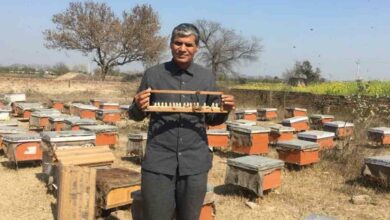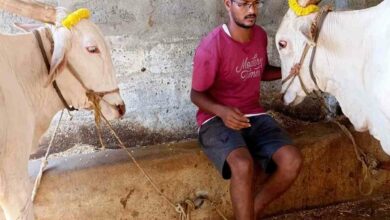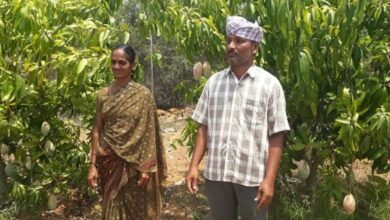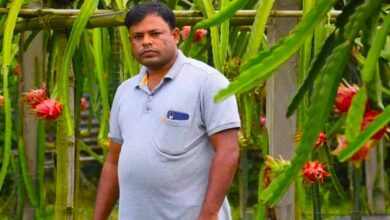A 67-year-old farmer from Punjab is earning lakhs of rupees annually by growing crops and dairy on barren land
Success Story: In 1996, Sukhdev Singh started farming at a time when it appeared like a difficult endeavor. It was almost hard to raise vegetables in his area at the time since the terrain was salty and barren. The difficulties didn’t end there; he also had to cope with a lack of water, which made farming more difficult. “I hardly got anything to grow in those early days. Thinking back on the difficult beginnings, Sukhdev says, “It felt like every effort was in vain.”
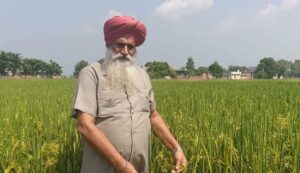
Even though Sukhdev had just finished his matriculation, he was nevertheless adamant about wanting to raise his family’s standard of living. His perseverance paid off when the Land Reclamation Programme, a government program, saved him. Together with the electricity supply, the program offered a 75% subsidy for the use of gypsum, a soil enhancer that helped turn his barren acreage into something profitable.
A Watershed Moment
A pivotal moment in Sukhdev Singh’s life occurred when gypsum was introduced into his crops. “It felt like I was witnessing a miracle happen,” he reflects, remembering the moment his empty field started to take on life. By enhancing the soil’s capacity to absorb water, gypsum helped restore the land’s fertility and lessen erosion and runoff. It took almost three years to complete this change, but the wait was worthwhile.
“I was finally able to see the results of my three years of hard work.” He smiles and adds, “It felt like the land was being reborn.” The area was now more fruitful, so Sukhdev decided to go beyond the paddy-wheat system and plant crops like sugarcane, potatoes, mustard, berseem, and maize. With every new harvest came cash gains and a fresh feeling of achievement for him.
Accepting Knowledge and Technology
Sukhdev made connections with the Farm Advisory Service Center (FASC) and Punjab Agricultural University (PAU) out of his desire to learn more. It turned out that going to such training sessions was essential to his pursuit of greatness in agriculture. He gained knowledge about cutting-edge crop types and contemporary agricultural methods that would subsequently increase his yields of sugarcane, wheat, maize, and rice.
Sukhdev says, “Learning from experts opened my eyes to new possibilities.” Equipped with this understanding, he set out to cultivate crops in a sustainable and astute manner. He installed an irrigation system using subterranean pipelines to save water, a resource they had previously had trouble managing.
Development Above Imagination
Sukhdev Singh put a lot of effort into not just improving his property but also purchasing equipment to enable him to increase the size of his agricultural activities. After his soil conditions improved in 1999, he bought his first tractor. In addition to using it for his own agricultural labor, he added an additional source of money by renting it out to other farmers. By 2002, he had made enough money to purchase a second tractor, which increased his output even further.
Sukhdev farms 18 acres of his own property and another 18 acres that he leases, for a total of 100 acres today. To keep his income varied, he grows a range of crops, such as wheat, rice, maize, and peas. He is respected for his unwavering determination and inventiveness and has become a prominent person in his community thanks to his strategic approach to farming.
Prudent Agriculture and Ecological Guardianship
Sukhdev’s emphasis on smart farming is a characteristic that sets his farming apart. “It’s not just about farming; it’s about smart farming,” he argues. His water-saving irrigation technology and habit of stockpiling corn and basmati rice to prevent distressed sales are clear examples of this strategy in action. His creative use of paddy straw to feed the soil rather than burning it adds even more evidence to his dedication to ecologically responsible agricultural methods.
His statement, “I never burn stubble,” Rather, I disperse it across the area to aid in preserving soil fertility and moisture. I feel obligated to return the favor since the land has given me so much.” He is respected by both agricultural specialists and his fellow farmers for his environmental care.
Developing a Dairy Farming Sector
Sukhdev not only farms crops but also has a prosperous dairy business. He presently produces roughly 126 quintals of milk a year from his 5–6 buffaloes and 7–7 cows. He notes that the extra milk is sold to nearby dairy facilities, bringing in an extra Rs. 3,78,000 annually. “The dairy business adds another layer of security and income,” he says.
In addition to providing an additional source of revenue, dairy farming has helped Sukhdev diversify his agricultural operations and increase his resilience to the erratic problems of agriculture.
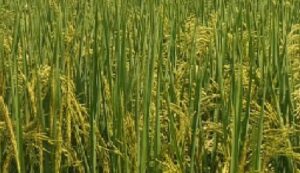
Financial Performance
Sukhdev Singh’s farm is a flourishing illustration of what may be accomplished with perseverance and astute agricultural techniques. Among his varied cropping patterns are:
The prices per acre for wheat, rice, basmati, maize, oats, turmeric, and marigold are as follows: Rs. 30,000 for wheat, Rs. 40,000 for rice, Rs. 27,000 for basmati, and Rs. 40,000 for maize. Sukhdev’s dairy business supplements his income, bringing him around Rs. 7 lakh in profit annually. His success is a direct result of his unwavering work ethic, adaptability, and creativity.
A Lighthouse of Wisdom and Motivation
In addition to being a prosperous farmer, Sukhdev Singh serves as a mentor to members of his community. He often imparts his experience to other farmers, urging them to embrace sustainable farming methods in particular. He speaks out strongly in favor of using the newest technological seeds, which he gets from KVK Kapurthala. “These seeds are pure and help me make more money,” he states, highlighting the need of high-quality agricultural supplies.
Often, Sukhdev counsels other farmers to care for their crops as if they were their own children. “If you take care of your land, it will take care of you,” he adds. He also emphasizes the need to utilizing chemical fertilizers sparingly and in compliance with professional guidance.
Appreciation and Heritage
PAU Ludhiana presented Sukhdev Singh with the Dalip Singh Dhaliwal Memorial Award for crop diversification in 2017. He received this prize in appreciation of his commitment to cutting-edge and environmentally friendly agricultural methods. “It was a moment of great pride to receive the award,” he adds, passion evident in his voice.
Many farmers are inspired by Sukhdev’s success story today, which shows that even the most difficult situations can be overcome with education, perseverance, and hard work.


